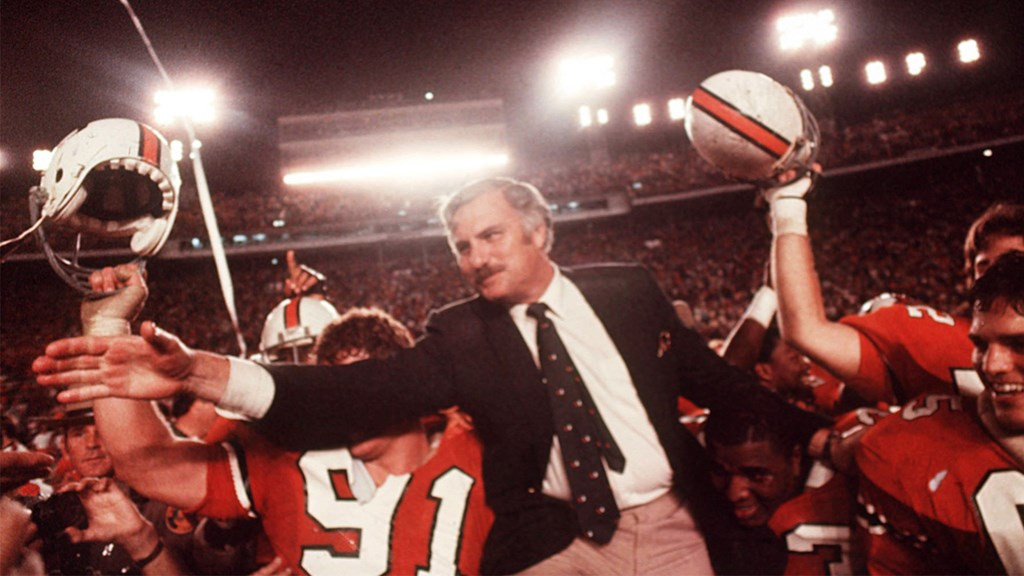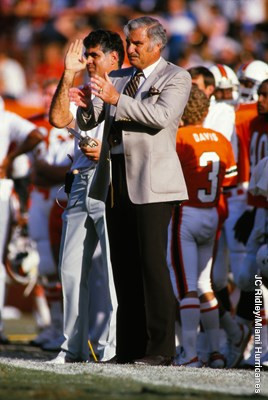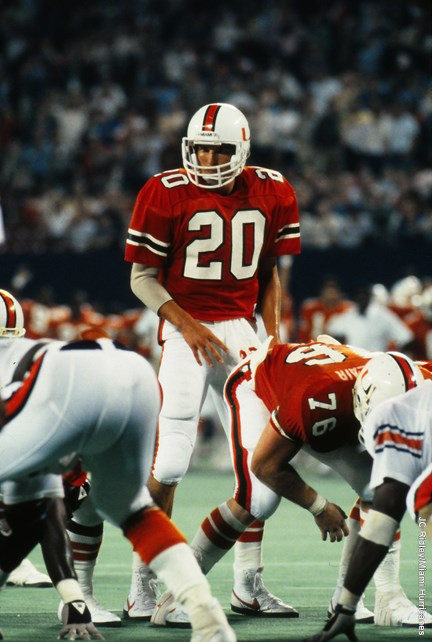
Schnellenberger Region: #1 1984 Orange Bowl vs. Nebraska
Miami Madness Bracket
Schnellenberger Region Winner:
#1 1984 Orange Bowl vs. Nebraska
Path to the Final Four:
Defeated #16 2013 vs. Florida, defeated #8 2017 at Florida State,, defeated #4 2000 vs. Florida State, defeated #7 2001 at Florida State
Game Details:
The Miami Hurricanes have always been trendsetters, but this is the game that established the Canes as a national power.
“1983 was the linchpin that put into place the wonderful talent that was assembled and would continue to create the greatest college football dynasty since World War II,” former Miami Hurricanes head coach Howard Schnellenberger said.
Upon his arrival in Coral Gables in 1979, Schnellenberger boldly predicted that the Hurricanes would win a National Championship within five years. Critics scoffed, but Schnellenberger’s players backed him up by doing exactly what their coach said they would – win a championship and become No. 1.
The 1983 Hurricanes ran the table on the season’s final 11 games, but they had to overcome a season-opening loss to the rival Florida Gators earn the glory of a national championship.
“We actually graded out really well that game,” running back Albert Bentley said. “That game killed us because of turnovers. We couldn’t overcome the turnovers and I just think we weren’t quite ready to play that game. It wasn’t that we were so bad. We just turned the ball over at bad times and weren’t able to win. The next week and every week after that we did much better in the turnover ratio and you saw how the rest of the season went.”
After that Florida loss, Miami won its next eight games by a combined score of 250-55. In that run, the Canes shut out No. 13 Notre Dame, 20-0, and almost did the same to No. 12 West Virginia, 20-3.
But the Canes had a pair of tight victories in the final two games of the regular season, beating ECU, 12-7, and closing the regular season with a one-point victory at Florida State, 17-16, to clinch a trip to the Orange Bowl and top-ranked Nebraska.
“Late in the season, we had a couple of scary games like the Florida State game and the East Carolina game,” Bentley said. “I still remember on the run for me touchdown against Florida State I kept thinking, ‘I don’t care what happens, I’m going to get in this end zone.’ We needed to score there and win the game and that was kind of the mindset of the whole team. We were willing to do whatever it took to win the game.”
In the Orange Bowl, the underdog Hurricanes got off to a 17-0 start against No. 1-ranked Nebraska and never looked back, prevailing 31-30 in what many called the most exciting college football game ever played. The win gave Miami its first of five Football National Championships.
“Winning the national championship and having the opportunity to get the ball to score and help the team win is a big time memory,” Bentley said. “Of course, when Kenny Calhoun knocked down that pass is a moment I’ll never forget.”
A defensive back, Calhoun tipped a pass by Nebraska quarterback Turner Gill to stop a Nebraska two-point conversion attempt and secure the Canes’ first national championship.
“It is important to remember that we did it first,” Calhoun said. “We showed that with good leadership and a good bunch of guys, you can achieve your goals.”
This was the first national title team without a single player making an All-America first team voted by AP, UPI, the Football Writers Association or the College Football Coaches Association.
“I think all of us have a great sense of accomplishment,” Bentley said. “When I look back now at that senior class and that junior class, we weren’t a team full of blue-chip kids. We were a bunch of hard workers. We were blue-collar and we worked really hard and got better from our freshman year to our junior and senior years. That hard work enabled us to be in position to win games because we worked so hard at improving ourselves every day and every year.”
The victory was monumental — for UM football and for college football in general. It was monumental not only because the Cornhuskers were widely considered to be among the most powerful teams in college football history, but it also heralded the dawn of a new dynasty in the sport from a program that had been all but dead just a few short years earlier.
“That week we felt really confident,” Bentley said. “We had played some really tough teams and I know Nebraska had some scores that season that were basketball scores and everyone just assumed that we were going to be tight and afraid to play against them. But we didn’t feel like they could matchup with us. We watched a lot of film of them and we didn’t feel they could matchup against what we were going to do in the passing game and that would open up opportunities in the running game and we would be able to score against them and it turned out to be true.”
A win over Nebraska — combined with losses by second-ranked Texas in the Cotton Bowl and Illinois in the Rose Bowl — vaulted the Hurricanes into the top spot in the final national rankings.
“The feeling at the end of that game is unforgettable,” Bentley said. “To know it’s sealed up, it’s history and I am a national champion is something incomparable to anything I’ve experienced. Eight years of professional football don’t compare to what I felt that night when I saw the ball hit the ground and I knew it was over. I still get chills thinking about it today when I take myself back to that moment. It was incredible.”
One of the keys was a melting pot offensive line — a Canadian (center Ian Sinclair), a Cuban-American (guard Juan Comendeiro), an African-American (guard Alvin Ward), an Italian-American (tackle Paul Bertucelli) and an Irish-American (tackle Dave Heffernan).
“It is just amazing the guys that Coach Schnellenberger put together,” Fitzpatrick said. “We might not have all been your five-stars, but he made us believe and play like we were six-stars.”
Miami was only the second national title team to gain more passing yards than rushing yards.
“It’s a tribute to a lot of gutty players and a real team effort,” Schnellenberger said at the time. “We’ve got a lot of overachievers on our team — or else there has been a poor job of selection done by the All-American selectors.”
Countless members of the 1983 national championship team credit Schnellenberger for so much of that team’s success. Fitzpatrick remembers how Schnellenberger’s practices made sure the Hurricanes were ready to dominate on Saturdays and more often than not they did exactly that.
“We had probably the best coach in college football,” nose guard Tony Fitzpatrick said. “What he did to us every week, during games, during spring, when it came Saturday, whoever you were playing, they had to pay the price. He encouraged you to be the best on Saturday and whether it be practicing, your body, whatever, and our strength coach, Ray Ganong, was a huge part of that, too.”
Led by a legendary head coach, a hungry and hard-working Miami team earned a victory over a seemingly insurmountable Nebraska squad to change the landscape of college football forever.
“That (1983 National Championship) was the foundation that put us on the map as a serious football program,” Bentley said.








